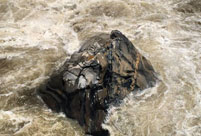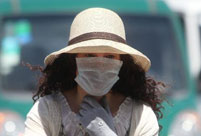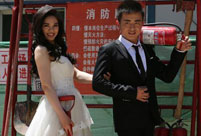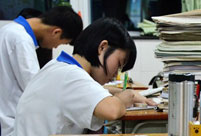 Luoyang aims to become 'Chinese Culture City'
Luoyang aims to become 'Chinese Culture City'
 Century-old jade disc found confirms ancient legend
Century-old jade disc found confirms ancient legend
 A serious mind behind Chinese leader
A serious mind behind Chinese leader
 Panda Cubs to Predict 2014 World Cup Winners
Panda Cubs to Predict 2014 World Cup Winners
 China Southern Airlines flight attendants win titles in service contest
China Southern Airlines flight attendants win titles in service contest
 Pupil's performance art persuades people to stop smoking
Pupil's performance art persuades people to stop smoking
 Nie Chenxi's clay tigers
Nie Chenxi's clay tigers
 Children's Day wishes
Children's Day wishes
 Chinese Kung Fu charms Silicon Valley
Chinese Kung Fu charms Silicon Valley
 Tranquil Yankou ancient town
Tranquil Yankou ancient town
BEIJING, June 10 -- The democratic political system of the Hong Kong Special Administrative Region (HKSAR) has been steadily promoted since its return to the motherland in 1997, said a governmental white paper issued on Tuesday.
The election of the chief executive and the Legislative Council of the HKSAR has become more democratic and direct, and the timetable has been set for universal suffrage, said a white paper on the practice of the "one country, two systems" policy in the HKSAR, issued by the State Council Information Office.
Before Hong Kong's return to the motherland in 1997, the United Kingdom designated governors to enforce colonial rule over Hong Kong for more than 150 years, the paper said. Since 1997, the HKSAR government and the legislature have been composed of local residents.
The chief executive of the HKSAR is appointed by the central government on the basis of the results of elections or consultations held locally; the legislature of the HKSAR is established by elections, it said.
The Basic Law of the HKSAR explicitly stipulates that the chief executive and all the members of the Legislative Council must be elected by universal suffrage, making universal suffrage a legal objective.
"The election of the chief executive of the HKSAR has become increasingly democratic," the white paper said.
Candidates for the first chief executive were elected by a 400-member Selection Committee, while candidates for the second, third and fourth chief executives were elected by the Election Committee, the membership of which in the meantime had grown from 800 to 1,200.
"The election of the Legislative Council is becoming more and more direct," said the white paper.
The first Legislative Council formed in 1998 had 20 members elected directly by geographical constituencies, 30 members by functional constituencies, and ten members by the Election Committee, it said.
The membership of the fifth Legislative Council elected in 2012 expanded to 70, including 35 members elected directly by geographical constituencies and 35 members by functional constituencies. The additional five members elected by functional constituencies were nominated by district boards, and elected by voters who had enjoyed no right to vote under functional constituencies, according to the white paper.
"The timetable has been set for universal suffrage," it said.
The 31st Session of the Standing Committee of the Tenth National People's Congress made a decision on Dec. 29, 2007 "that the election of the fifth chief executive of the HKSAR in 2017 may be implemented by the method of universal suffrage; that after the chief executive is selected by universal suffrage, the election of the Legislative Council of the HKSAR may be implemented by the method of electing all the members by universal suffrage," thus setting a timetable for the selection of the chief executive and all members of the Legislative Council by universal suffrage.
From Dec. 4, 2013 to May 3, 2014, the HKSAR government initiated a five-month public consultation on the election of the chief executive in 2017 and that of the Legislative Council in 2016, starting the relevant procedures for introducing universal suffrage.
 Magnificent Hutiao Gorge
Magnificent Hutiao Gorge  Heat waves hit China
Heat waves hit China Love at the construction site
Love at the construction site Graduation photos bring memories back to life
Graduation photos bring memories back to life Art school students present works in Nanjing
Art school students present works in Nanjing Xinjiang's first high-speed railway goes on trial run
Xinjiang's first high-speed railway goes on trial run 3D Sea-life Themed Art Garage unveiled in Zhengzhou
3D Sea-life Themed Art Garage unveiled in Zhengzhou
 Creative Photos go viral during graduation season
Creative Photos go viral during graduation season Students in last-minute effort for Gaokao
Students in last-minute effort for Gaokao Dali, an ideal summer vacation destination
Dali, an ideal summer vacation destination Xichan Temple's little monk hit the Internet
Xichan Temple's little monk hit the Internet Monologue of a modern dancer
Monologue of a modern dancer College girl proposes to boyfriend on Weibo
College girl proposes to boyfriend on Weibo Special operation members in counter-terrorism training
Special operation members in counter-terrorism training American football brings manhood out of boys
American football brings manhood out of boysDay|Week|Month